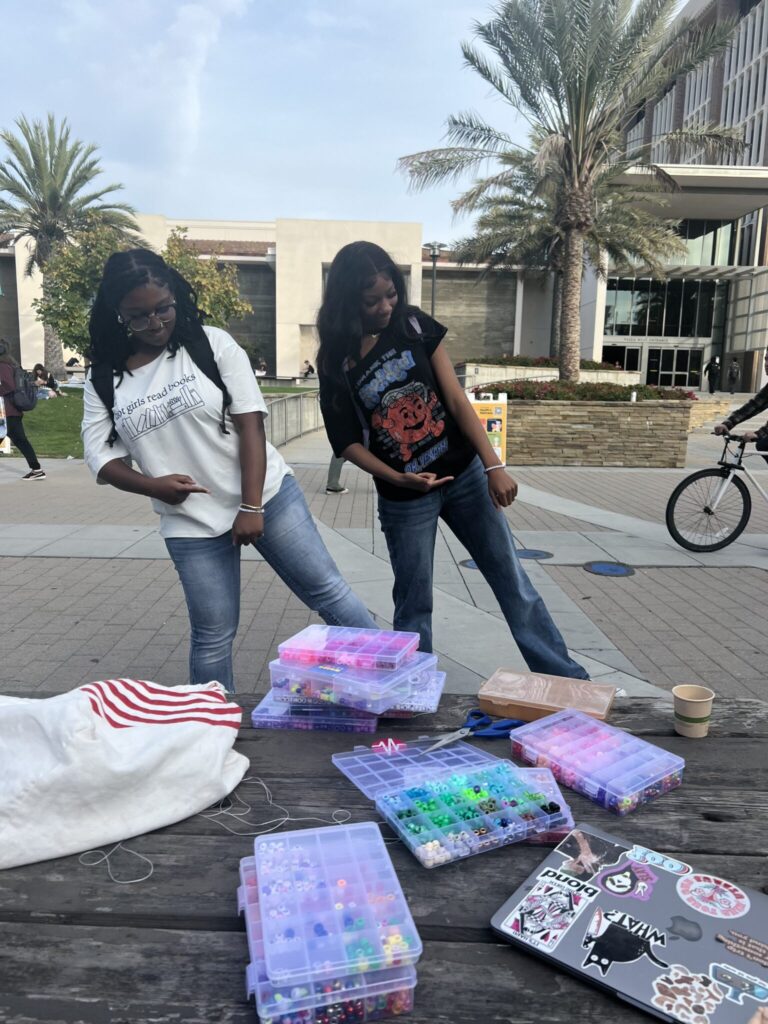The UC Santa Barbara Caribbean Student Association has brought back “Black Wednesdays,” an event that began in the mid-1980s, which aims to raise awareness on the presence of the Black community on campus.

CSA aims to host Black Wednesdays weekly in order to raise awareness on Black community’s presence on campus. Courtesy of Kaliah Karriem
The event has been held twice this quarter, on Oct. 22 and Nov. 5 by the Arbor walkway, where the Caribbean Student Association (CSA) board members spoke to passersby and created and sold bracelets for fundraising purposes.
The Black Student Union (BSU) began to organize Black Wednesdays in 1985, which would take place every Wednesday at 12 p.m. The event facilitated bonding between Black students and faculty on campus, allowing attendees to build relationships and connections. It also served as a “political space” where community members could deliver political addresses and host rallies.
The co-presidents of CSA — fourth-year history of public policy and law major Nyela Nesbeth and fourth-year Black studies major Faith Kingsbury — learned about the history of the event after speaking to Black administrators and alumni.
“We found out through connecting with some of our Black alumni who discussed how prosperous and joyful the Black community was in the past at UCSB, and they motivated us to continue this tradition, noting that they have no idea why it died out,” Nesbeth said.
According to Nesbeth and Kingsbury, the alumni they spoke to described UCSB as “a place where the Black community was unified” when Black Wednesdays first started, which the alumni described as a “heyday” for the community. During this time, the community would work on proposals and statements, as well as promote collective action for the Black community.
Nesbeth and Kingsbury said that they feel like there have been various challenges affecting the Black community at UCSB, including changes within the Office of Black Student Development (OBSD), and a lack of a “proper director [at the OBSD] for years on end.”
They also said that instances of anti-Black racism, inappropriate comments from students, issues within the Educational Opportunity Program (EOP) and the “initial removal of the [African diasporic Cultural Resource Center] director’s position and role collaborating with students” were issues that they have observed.
Due to these issues, Nesbeth and Kingsbury felt compelled to revitalize the event.
“We really felt like there was a time to create unity now more than ever,” Nesbeth said. “Because it really seems like many people throughout the school and the UC system are trying to break down Black students, as you can see, with the levels of retention that Black students have at the school.”
Nesbeth and Kingsbury hope that the event will be able to promote unity within the Black community on campus.
“We just decided that we wanted to bring it back because we noticed that Black students aren’t very unionized when it comes to a lot of events,” Kingsbury said. “We want it to be showcased that we are collaborating together — we’re all here.”
Additionally, Nesbeth and Kingsbury said they hope that by hosting Black Wednesdays, they can raise awareness for the political and social issues that affect the Black diaspora. The issues they cited include detainments by immigration enforcement without due process, the evaluation of the diversity, equity and inclusion programs and current events within American politics.
CSA aims to host Black Wednesdays every Wednesday, but is starting out by hosting it every other Wednesday. Nesbeth said that CSA’s small size has made it difficult to round up the manpower to host the event weekly.
In the future, CSA will try to collaborate on Black Wednesdays alongside the Black Student Union and the Black Women’s Health Collaborative.
“We would like to have their organizations table and be there to support all of us, as well as [to] take up that space that we so desperately need to,” Kingsbury said.
A version of this article appeared on p. 5 of the Nov. 20 print edition of the Daily Nexus.





















The FoxNwes-whaching republitard what occupeis 1600 Pittsburgh Ave hates the negro community and we must RECIST him because he is a FACSCIST. He wants to deport any one what is’nt a white redneck like he is. We must VOTE DEMOCRAT because we no that IT TAKE”S A VILLAGE
Advanced adult dolls offer an unmatched sense of realism thanks to their innovative design and high-quality materials. They provide tactile pleasure with soft silicone or TPE skin that looks and feels genuine. Joints are flexible, allowing natural poses and comfortable interactions. Customers appreciate how the dolls’ appearance, weight, and touch create a lifelike presence. You can open article highlights some of the top-rated models and reviews, helping buyers make informed decisions. These dolls are not only realistic but also durable, offering a long-lasting experience. Their careful design ensures every feature contributes to a natural and engaging encounter for users.
While the Caribbean Student Association brings back community-building events like Black Wednesdays to campus life, many adults also explore ways to enrich their personal well-being and leisure interests. Just as students value connection and quality experiences, enthusiasts looking for realistic adult companions pay attention to design, form, and craftsmanship. For those curious about premium adult products, including detailed companions, check out Dripana for inspiration and curated selections.